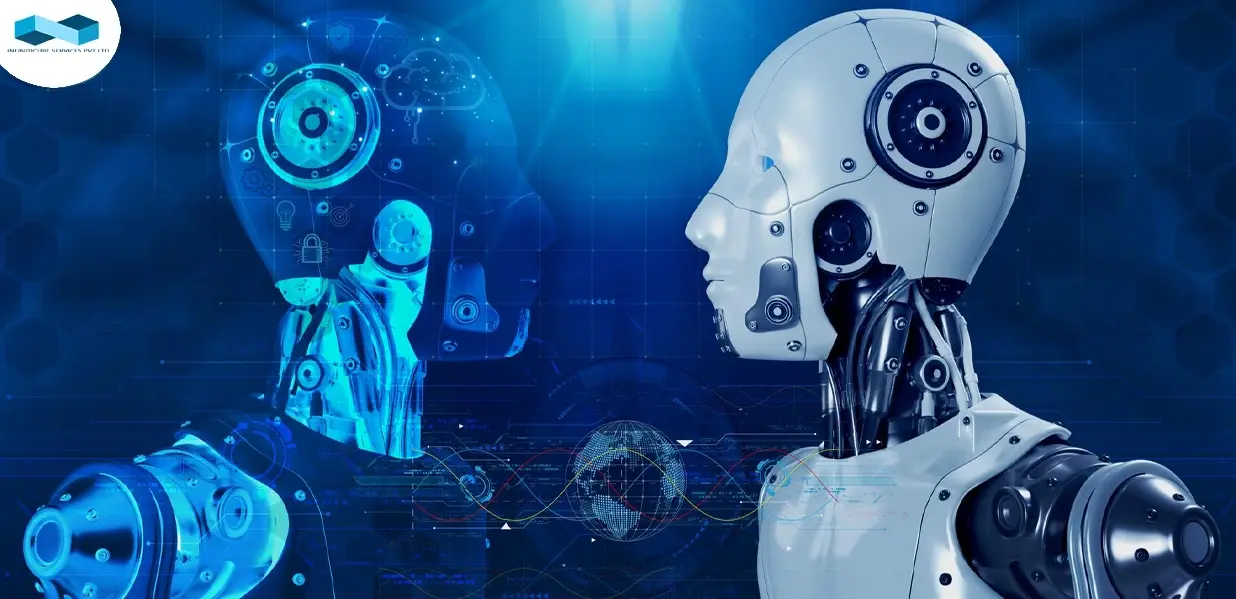6 Key Elements of DevOps Mindset
The DevOps approach has emerged as a game-changer in the fast-paced world of software development, where innovation is the name of the game. To properly comprehend and utilize the power of DevOps, one must first understand the key elements of DevOps mindset.
Now, you might be thinking, why do you need to know about it? What purpose it will fulfill? Well, you have to read the complete blog, only if you are eager to implement DevOps solutions in your business or enhance your DevOps knowledge.
In this blog series, we'll take an illuminating journey into the 6 key elements of DevOps mindset. These are the guiding stars for any firm seeking to negotiate the complicated terrain of modern software development while focusing on agility, efficiency, and customer-centricity.
Each component is a puzzle piece that, when put together, forms the broader picture of what it means to embrace the DevOps philosophy. These elements are the foundation of DevOps excellence, ranging from fostering cooperation and automating procedures to establishing a culture of shared responsibility and responding to change.
Join us as we unravel the mysteries of the DevOps mindset, one aspect at a time, whether you're new to the DevOps field or a seasoned practitioner looking to enhance your understanding. By the end of this blog, you'll have gained the knowledge and insights on DevOps transformation and drive success in the ever-changing landscape of software development.
Collaboration and Communication
The DevOps theology has arisen as a disruptive force in the arena of modern software development, where speed and precision are important. DevOps is far more than tools and processes; it is a deep culture revolution that redefines how teams cooperate and communicate. In this section, we'll look at the key elements of DevOps mindset: collaboration and communication.
Breaking Down Silos
Historically, many firms worked in silos, with development and operations teams rarely exchanging ideas or insights. This compartmentalized strategy frequently resulted in inefficiencies, miscommunication, and, at times, a sense of "us versus them."
DevOps eliminates these silos by fostering cross-functional teams that collaborate smoothly. DevOps develops a culture of togetherness and shared accountability by breaking down these barriers, allowing everyone to work toward a similar goal: producing high-quality software.
Effective Communication
Collaboration without communication is akin to sailing without a map. The importance of clear and effective communication is emphasized in DevOps. This includes not only technical discussions, but also open and honest exchanges about objectives, progress, and obstacles.
DevOps enables teams to detect issues early and jointly address them by creating a culture of transparency. Chat platforms, project management software, and regular stand-up meetings help to promote this communication. Effective Communication of the key elements of DevOps mindset helps teams to stay on track and respond quickly to changing requirements.
Technology is critical in modern software development, and DevOps uses it to improve cooperation. Collaboration technologies, like as version control systems (e.g., Git), issue tracking software (e.g., JIRA), and shared documentation platforms (e.g., Confluence), make it possible for teams to operate efficiently together.
These solutions give a centralized location for team members to collaborate in real-time, track changes, and document decisions. They also aid in the preservation of a transparent and auditable record of the development process.
Empowering Cross-Functional Teams
Collaboration isn't just a nice-to-have as one of the key elements of DevOps mindset; it's a core principle. Teams are empowered to own their work rather than delegating it to another group, as was usual in traditional methods.
This empowerment fosters a sense of ownership and pride in one's job. The entire software delivery pipeline is owned by DevOps teams, from code creation to deployment and monitoring. When teams are empowered and work well together, they may drive innovation and accomplish incredible results.
Automation
Automation is a force multiplier in DevOps. It is the technique that converts time-consuming, repetitive jobs into efficient, repeatable processes. This not only saves time but also significantly decreases the possibility of human error. This is one of the key elements of DevOps mindset that works diligently behind the scenes to guarantee that code is regularly and reliably built, tested, and delivered.
Continuous Integration and Continuous Deployment (CI/CD)
It is one of the most known faces of automation in DevOps. CI/CD pipelines are the DevOps automation backbone, ensuring that code is rapidly merged, tested, and deployed. They let developers routinely merge their code changes into a shared repository, where automated tests are run and the work is automatically published to production if successful. This ongoing procedure ensures that code changes reach consumers' hands faster than ever before.
Infrastructure as Code (IaC)
DevOps automation extends beyond software development to include the complete infrastructure. Infrastructure as Code (IaC) enables organizations to use code to describe and manage infrastructure.
This means that infrastructure may be automatically provided, configured, and scaled, avoiding the need for manual intervention and the possibility of configuration drift. IaC treats infrastructure like code, guaranteeing that it is versioned and automated in the same way that software is.
Benefits of Automation
The benefits of automation in the key elements of DevOps mindset are manifold.
- Speed: Automation shortens the time required to accomplish processes, allowing for a speedier time-to-market.
- Reliability: Automated procedures are more consistent and less prone to errors, resulting in higher-quality results.
- Consistency: Automation guarantees that duties are completed consistently.
- Efficiency: Teams may focus on more strategic and creative work by automating manual tasks.
- Scalability: Automated infrastructure and deployment procedures can be scaled up or down as needed.
- Risk Reduction: Automation lessens the risk of human mistakes while minimizing downtime due to misconfigurations or improper deployments.
Feedback and Continuous Improvement
This amongst other key elements of DevOps mindset promotes a culture of continuous improvement, creativity, and adaptation in the ever-changing world of software development. This key element fuels the continuing cycle of learning and optimization, ensuring that software development and delivery processes are cutting-edge.
Monitoring and Feedback Loops
DevOps teams understand that software applications and systems are not static; they, like the procedures that surround them, must evolve. To stay ahead, they rely on comprehensive monitoring systems and feedback loops.
These technologies provide real-time insights about the performance, stability, and security of applications. They act as the eyes and ears of the DevOps ecosystem, allowing teams to respond swiftly to emerging issues and capitalize on opportunities for improvement.
Success in the DevOps mentality is assessed not by gut instinct, but by quantifiable Key Performance Indicators (KPIs). Teams develop metrics like as deployment frequency, lead time, change failure rate, and mean time to recovery that are linked with business objectives. DevOps practitioners have a holistic perspective of their performance and can make data-driven decisions for improvement if these KPIs are tracked on a regular basis.
Post-Incident Reviews
No software system is impervious to errors or mishaps. In the DevOps environment, however, every incident is viewed as an opportunity to learn and grow. Post-incident reviews, often known as "blameless post-mortems," are widespread.
Teams conduct these evaluations to determine what went wrong, why it happened, and what steps may be made to avoid a recurrence. With each iteration, this method transfers the emphasis from blame to learning, making the system more resilient.
The Concept of "Fail Fast, Learn Fast"
Fear of failure is replaced by acceptance in DevOps, provided it is done quickly and with a learning mentality. The "fail fast, learn fast" philosophy of the key elements of DevOps mindset encourages experimentation and creativity. It recognizes that not every proposal will succeed, but those that do will result in significant changes. Failure is regarded as an important source of feedback, guiding teams toward more robust solutions.
Culture of Shared Responsibility
The DevOps mindset isn't just about tools and practices; it's a profound cultural transformation that reshapes the way teams work together. At the core of this cultural shift is the key element known as the "Culture of Shared Responsibility." This part of the key elements of DevOps mindset fosters an environment where collaboration, trust, and accountability reign supreme.
Shifting from Blame to Shared Responsibility
When anything went wrong in old software development paradigms, it was common practice to point fingers. DevOps alters the game by substituting a culture of shared accountability for the blame game.
Instead than seeking for someone to blame, teams concentrate on discovering the core causes of problems and working together to create solutions. This move not only encourages unity but also speeds up the resolving of issues.
Empowering Teams
DevOps allows teams to take responsibility for their work. This empowerment extends across the whole software delivery pipeline, from code creation to deployment and maintenance.
Teams have the freedom to make their own judgments and drive progress in their particular domains. This autonomy, combined with shared accountability, instills pride in the work being done and develops an innovative culture.
Encouraging Accountability
Accountability is a core principle of the DevOps culture. Members of the team are held accountable for their actions and decisions. When a problem emerges, instead of assigning blame, teams accept ownership of the issue and work together to fix it.
Accountability guarantees that everyone is committed to providing high-quality software and improving processes on a constant basis.
Security as a Shared Responsibility
In the DevOps culture, security is not a separate department; it is a shared duty. DevOps teams understand that security should be built into the software development process from the start. Security becomes a natural and integral component of the DevOps workflow rather than an afterthought when security procedures are implemented early in the development lifecycle.
Flexibility and Adaptability
The DevOps attitude shines as a light of flexibility and adaptation in the ever-changing world of software development, where change is constant and uncertainty is the norm. The key elements of DevOps mindset recognize that rigidity is the enemy of development and promote the ability to pivot, innovate, and adjust to new situations with ease.
Embracing Change and Uncertainty
The DevOps attitude recognizes that change is not only unavoidable but also an opportunity for growth. DevOps teams welcome change with open arms, whether it's changing consumer wants, developing technology, or market dynamics.
They understand that the ability to adapt to change gives them a competitive advantage. Teams in a DevOps environment are fluid and responsive, ready to pivot when circumstances call for it.
Agile Principles in DevOps
Agile is more than a buzzword; it is an essential component of the key elements of devops mindset. Agile practices, such as iterative development, frequent releases, and customer feedback loops, are frequently used by DevOps teams.
This method enables teams to remain adaptable, modify priorities, and provide incremental value to end users. Agile principles enable teams to respond rapidly to changing requirements and consumer feedback by breaking work down into smaller, manageable portions.
Scalability and Resilience
DevOps approaches are intended to be scalable and robust. Systems and infrastructure are designed to accommodate growth and change. Automation and Infrastructure as Code (IaC) are critical in guaranteeing that infrastructure can be quickly scaled up and down to suit changing needs. The system's DNA includes resilience, which ensures that it can endure unanticipated obstacles and continue to provide services without substantial disruption.
Managing Technical Debt
Accumulating technological debt is a common difficulty in a continuously changing environment. Technical debt refers to development shortcuts, concessions, and hasty fixes. While these may bring short-term benefits, they frequently cause long-term problems.
DevOps teams understand the necessity of controlling technical debt and set aside time to do so. This proactive strategy helps to avoid the buildup of severe debt, which can stifle development.
Customer-Centric Approach
In the dynamic world of software development, the DevOps mindset revolves around a key element: a Customer-Centric Approach. This key element ensures that all the other facets of DevOps, such as collaboration, automation, feedback, shared responsibility, and adaptability, converge to deliver software that not only meets but exceeds the needs and expectations of the end-users.
Understanding the Customer's Needs
The foundation of a Customer-Centric Approach is a deep understanding of the customer's needs. DevOps teams invest time in gathering, analyzing, and regularly updating their knowledge about the user base.
This insight guides development decisions, ensuring that the software aligns with real-world requirements. Understanding the "why" behind the software drives its purpose and relevance.
User Experience and Satisfaction
DevOps teams recognize that it's not enough to merely meet functional requirements; the user experience (UX) must be exceptional. A great user experience isn't just a nice-to-have; it's a non-negotiable factor that determines the success of software.
DevOps continuously strives to enhance the UX by soliciting user feedback, conducting usability tests, and iterating based on user preferences.
Feedback-Driven Development
Feedback is the lifeblood of a Customer-Centric Approach. DevOps teams establish feedback loops with the end users, be it through surveys, user groups, or customer support channels.
This feedback-driven development ensures that the software is a reflection of user preferences and pain points. When end-users feel heard and see their feedback translated into improvements, it fosters a sense of ownership and loyalty.
Aligning Business Goals with DevOps Practices
In the DevOps mindset, success isn't measured by how many lines of code are written or how many releases are made; it's about how well the software aligns with the organization's business goals.
DevOps practices are designed to facilitate the swift and reliable delivery of value to customers, ensuring that the software is not just a technological marvel but a strategic asset that drives business growth.
Conclusion
In conclusion, the DevOps mindset represents a groundbreaking paradigm shift in the world of software development and delivery. Throughout this journey, we've explored the six key elements of DevOps mindset :
- Collaboration and Communication
- Automation
- Feedback and Continuous Improvement
- Culture of Shared Responsibility
- Flexibility and Adaptability
- Customer-Centric Approach
The DevOps mindset, with its six key elements, equips organizations to navigate the complex and ever-changing terrain of modern software development. It empowers teams to stay agile, efficient, and focused on customer needs, ensuring their relevance and success in a tech landscape that continues to evolve at an unprecedented pace. By embracing this mindset, organizations are not just keeping up with the times; they are poised to lead the way in the digital age.
Why Choose Us?
Choosing Infiniticube for implementing DevOps development solutions in your business is the gateway to a transformative journey that embodies the six key elements of the DevOps mindset. With a deep-rooted understanding of collaboration, automation, feedback, shared responsibility, adaptability, and customer-centricity, we are more than just a service provider; we are your dedicated partner in your DevOps transformation.
Our expertise in these elements ensures a comprehensive and holistic approach to DevOps, where we break down silos, streamline processes, emphasize continuous improvement, cultivate a culture of unity and accountability, and prioritize the needs and satisfaction of your end-users.
With Us, you're not just adopting DevOps; you're embracing a philosophy that accelerates your business into the future with efficiency, innovation, and unwavering customer focus. Your DevOps journey begins here, and it begins with a partner who understands the true essence of DevOps.
Contact us today to discover how we with our DevOps services can reshape your business for success.
Let's embark on a journey of efficiency, collaboration, and customer-centricity that will propel your organization to new heights. Take action now! Schedule a meeting call with our expert to discuss your software development project. Your transformation begins with Infiniticube.
 June 27, 2025
June 27, 2025
 Balbir Kumar Singh
Balbir Kumar Singh
 0
0
 June 13, 2025
June 13, 2025
 Balbir Kumar Singh
Balbir Kumar Singh
 0
0









Leave a Reply